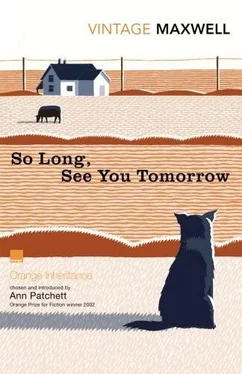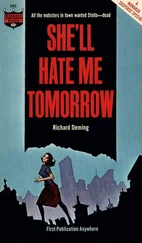Cletus still wasn't worried. His father had never not given them anything for Christmas.
Wayne wanted to play Old Maid. As Cletus sorted out his cards he listened for the sound of footsteps on the porch. After a while Aunt Jenny got up and began to stir around in the kitchen.
"I find it very strange of your father not to make any effort about your Christmas," Fern Smith said. What she found even stranger was that Cletus didn't seem to care. Maybe it was a stage he was going through, but he seemed so indifferent these days. About everything.
The decorated tree on the courthouse lawn was much too large to go in any house. On Christmas Eve people had sung carols around it, but now the square was deserted, except for two men standing in front of the drugstore. One of them was a traveling salesman who hated Christmas. The other was Clarence. Though he was looking straight at the big Christmas tree, he didn't know it was there. Or what day it was. Or why the courthouse square was so deserted.
"I thought the world of him," he said to the traveling salesman, "till he broke up my home…."
Once the dog thought she saw Wayne from a distance, but it turned out to be only another little boy who looked like him. People tried to catch her but she didn't let them get that near. Her coat was dry and her eyes were lackluster and she was skin and bones. She lived on rabbits and other small animals and an occasional chicken that got loose from the run. Finally she ended up in town, where some children chased her and threw sticks at her but she managed to get away from them. At night she foraged in garbage cans.
In the end she found them. Clarence Smith's mother looked out of the window at the side yard and exclaimed, "I declare, it looks like we've got company."
From the way the man made over her, the dog thought she was going to be allowed to stay. And that he would take her to where the boy was. She smiled ingratiatingly at the old woman, who said, "It's all right with me if you want to keep her here," but that wasn't what happened.
In the condition she was in, Clarence couldn't bring himself to give her a beating. He took her back to the farm and said, "I guess you'll have to keep her tied up for a little while. I don't know what's got into her. She's always been a good dog, and never given me any trouble."
Then he went around the place, looking in all the sheds and in the cow barn and the horse barn, for something he'd forgotten or lost somewhere. And a few days later he came back and did the same thing.
The new man's woman came, and more snow fell, and the ground was white, and the snow turned to ice, and the dog slipped and slid when she tried to go anywhere, so she stayed in her house and slept. Sometimes she dreamed she was waiting at the mailbox for the boy to come riding up the road on his bicycle.
Awake she wasn't anybody's dog. When she felt like wandering she waited until the new man wasn't looking and then slipped away.
"The new tenant couldn't get Trixie to stay on the place," Fern said to Cletus. "So your father took her to the vet's and had her put out. With chloroform. You must forgive him. He isn't himself."
She wasn't herself either, or she would have kept this information from him, or at least broken it to him more gently.
Her letters to Lloyd Wilson were now almost entirely taken up with her fears about Clarence.
The lawyer who had successfully steered Fern through the divorce proceedings twiddled his thumbs thoughtfully. Then, leaning back in his chair, he said, "Did Smith actually say in so many words that he was going to shoot you?"
"No," Lloyd Wilson said. "But I know that he has a gun. And from the way he is acting—"
The lawyer glanced at his desk calendar to see what his next appointment was. "I dare say you have every reason to be alarmed, but unless you can provide a witness who is ready to swear that Smith threatened to take your life, I doubt if the sheriff's office will consider that there are sufficient grounds to issue a warrant for his arrest. Suppose you keep in touch with me, and if there is any change in the situation…"
When I go home, usually because of a funeral, I always end up walking down Ninth Street. I give way to it as if it was a sexual temptation. The house we lived in has changed hands several times, and some fairly recent owner sheared off the whole back part — the pantry, the back stairs, the kitchen, the laundry where the cookstove was, and that upstairs bedroom where the Halloween party took place. Why? To save fuel? The porch railings and the trellises are gone, and so is the low iron fence that separated the front yard from the sidewalk. The high curbing and the two cement hitching posts are still there, having outlived their purpose by half a century. The elm blight killed off the two big trees I played under, and in their place are some storm-damaged maples, so oddly placed that they must have been planted by the birds. In the back yard, where the flower garden used to be, there is a structure about the size and shape of a garage, but with a curtained picture window. Somebody must live in it.
The house next door went up in smoke and flames one night ten or fifteen years ago — defective wiring — and where it stood there is a two-story apartment house that covers half of what used to be our side yard. Here and there all over town big old houses are missing, or between two old houses that have survived somebody has inserted a new house, spoiling my recollection of things. When I come upon the new hospital I totally lose my bearings. Where exactly was the little grocery store my mother used to send me to when she discovered she was out of rice or butter or baking soda? And which wing of the hospital has obliterated the huge bed of violets in the back yard of the house where old Mrs. Harts lived with her son Dave, who never married? And was the bed of violets huge only because the child who once a year knocked on the back door and asked for permission to pick them was so small?
When I dream about Lincoln it is always the way it was in my childhood. Or rather, I dream that it is that way — for the geography has been tampered with and is half real, half a rearrangement of my sleeping mind. For example, the small red-brick house where Miss Lena Moose and Miss Lucy Sheffield lived. It was probably built during the administration of General Ulysses S. Grant, and must have had dark woodwork and heavy curtains shutting out the light. When I dream about it, the proportions are so satisfying to the eye and the rooms so bright, so charming and full of character that I feel I must somehow give up my present life and go live in that house: that nothing else will make me happy. Or I dream that I am standing in front of a house on Eighth Street — a big white house with a corner bay window and carpenter's lace and scalloped siding. I have been brought to a stop there on the sidewalk by the realization that my mother is inside. If I ring the doorbell, she will come and let me in. Or somebody will. And I will go through the house until I find her. But what is she doing there when it is not our house? It doesn't even look like our house. It was built in the eighteen-nineties, and our house is much older than that, and anyway, it's on Ninth Street. In order to deal with this riddle I let my mind wander up Eighth Street, beginning at the corner where the streetcars turn and go downtown, and before I get to the house I was dreaming about I realize there is no such house, and I am, abruptly, awake.
After six months of lying on an analyst's couch — this, too, was a long time ago — I relived that nightly pacing, with my arm around my father's waist. From the living room into the front hall, then, turning, past the grandfather's clock and on into the library, and from the library into the living room. From the library into the dining room, where my mother lay in her coffin. Together we stood looking down at her. I meant to say to the fatherly man who was not my father, the elderly Viennese, another exile, with thick glasses and a Germanic accent, I meant to say 1 couldn't bear it, but what came out of my mouth was "I can't bear it." This statement was followed by a flood of tears such as I hadn't ever known before, not even in my childhood. I got up from the leather couch and, I somehow knew, with his permission left his office and the building and walked down Sixth Avenue to my office. New York City is a place where one can weep on the sidewalk in perfect privacy.
Читать дальше












